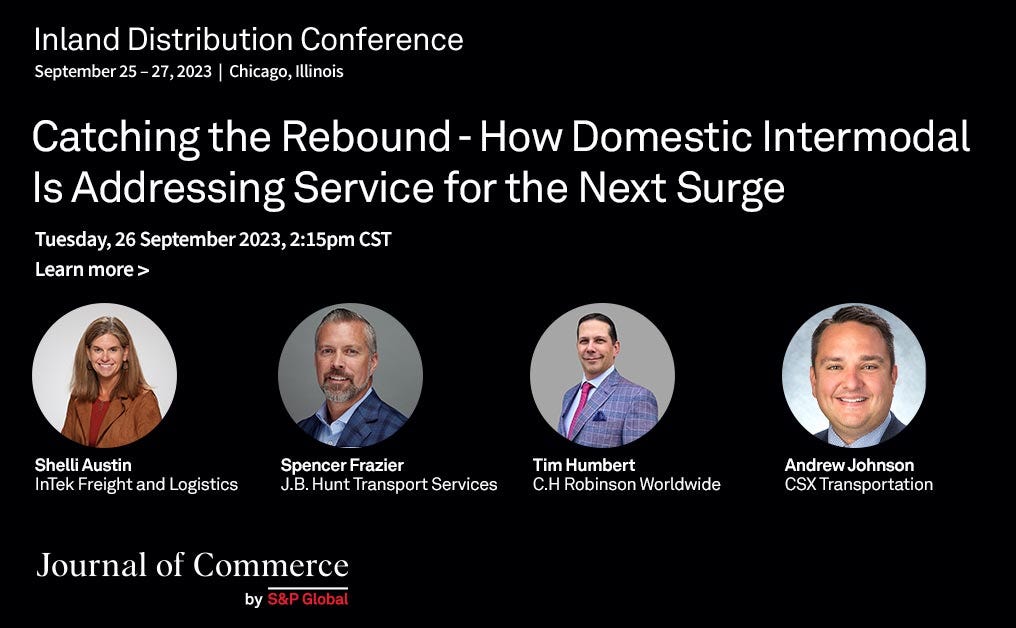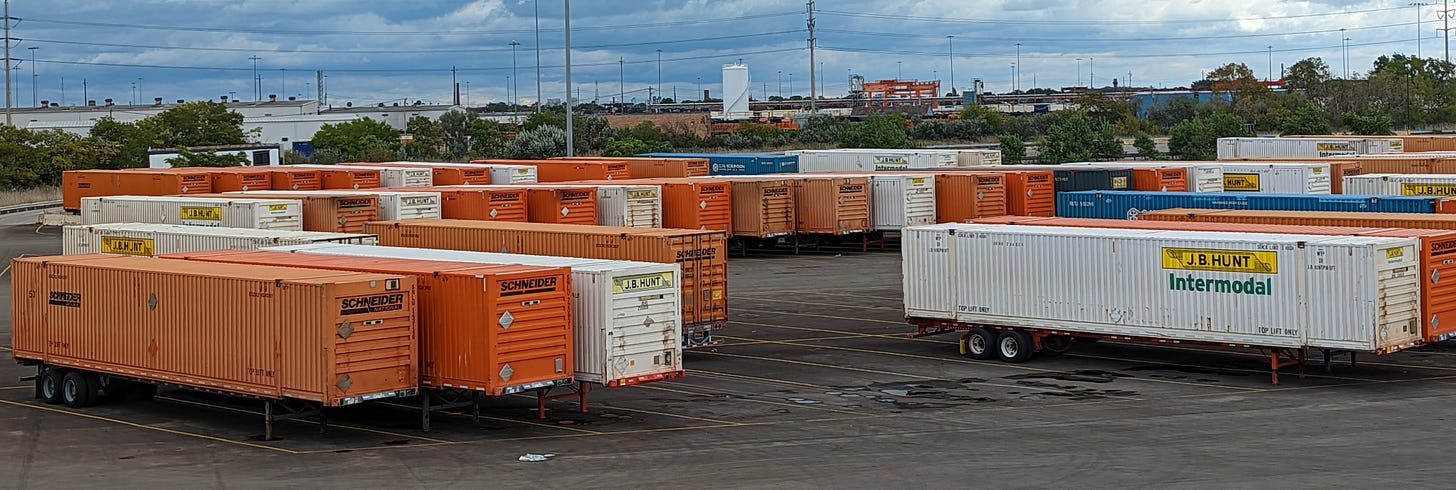Welcome Please Haul My Freight: Edition 43. Here are some items in my notebook this week:
LET’S MAKE A DEAL: It’s welcome news that the ILWU and PMSA have a tentative deal in place to solve their year-plus labor dispute over a new collective bargaining agreement. One question people ask me is what it means for port volumes. I believe until there is a macroeconomic catalyst to bring in cargo in large qualities, the West Coast will struggle through 2023.
As far as international intermodal (IPI) from California ports inland, the chart below shows how volume significantly trails the five-year average, according to the Intermodal Association of North America. The IPI situation bottomed out in January and February, but May’s IPI was still down 18% from the five-year average.
PANAMA CANAL: However, the Port of Los Angeles and Port of Long Beach may benefit by the issues impacting the Panama Canal. The Panama Canal Authority (ACP) has announced further restrictions on the maximum authorized draft in locks due to the worst drought in a century. The ACP may also eventually limit the number of daily transits. About 10 ships a day move through the newer locks, and about 27 smaller vessels travel through the older locks. We’ll be monitoring how the Panama Canal issue impacts port volumes and IPI in the Southwest.
TIGER COOL: As we reported last week, Tiger Cool Express shut its doors after its private equity owners pulled its funding for the company. An interesting question is what will happen with 700 containers of Tiger Cool. Other providers are already stacking containers, so I cannot see any interest from C.R. England, KLLM Transport, Prime Intermodal, or others. One option could be CPKC given an emphasis on introducing temperature-controlled intermodal and new collaboration with Americold Logistics announced June 21.
INTERMODAL SERVICE: More than 8 out of 10 intermodal users believe intermodal service is heading in the right direction, according to the Spring 2023 Journal of Commerce Intermodal Service Scorecard.
The data shows an inverse relationship between intermodal volume and train speeds. When the volume index falls below 100, the train speed index rises above 100 (i.e. April 2020, current times). Conversely, when the volume index is above 100, the train speed index drops below 100 (i.e. 2018 and 2021).
That makes sense, right? An interstate on Sunday morning at 3 a.m. is wide open because there are fewer cars. The interstate is bumper-to-bumper at 5 p.m. on Monday when people are driving home from work.
It’s fair to question whether intermodal service will deteriorate again when volume rebounds. It’s a topic we’ll discuss in two sessions at the Inland Distribution Conference, including the session below and another with BNSF Railway, Canadian National, and Norfolk Southern Railway:
Click the photo to register and use code “AASUBSTACK20” for a special Substack discount! Come to Chicago. Say Hi. Introduce yourself.
CONTRIBUTE TO THE SCORECARD: One reason we can have these sessions is because of the Intermodal Service Scorecard survey. It provides us data that to ask the right questions to intermodal providers.
It’s essentially an Angi’s or Home Advisor for domestic intermodal. Like homeowners can review plumbers or roofers on these websites, our survey allows intermodal users to anonymously score their service partners on KPIs. We tabulate the results and create a scorecard to identify the best service providers, just like a homeowner can find top-rated plumbers or roofers on Angi’s or Home Advisor.
Consider participating. All responses are anonymous. Click the photo to contact me:
LESS THAN TRUCKLOAD: We’re closing watching two union negotiations with the Teamsters: UPS and Yellow. A UPS strike would have very clear ramifications across the parcel and LTL industry. The concern about Yellow is that it will go bankrupt.
Yellow has been in a financially precarious position for many years and probably would not have survived had it not received a $700 million loan from the US Treasury in the CARES Act in 2020.
Meanwhile, Roadrunner launched eight new lanes for its long-haul LTL service:
Inbound service to Richmond, Newport News, and Virginia Beach, Virginia from Commerce, Los Angeles, and San Francisco, California.
Inbound service to Las Vegas from Chicago, Cleveland, Detroit, Milwaukee, and Philadelphia.
Once considered a low-cost, low-quality provider, several shippers have told me Roadrunner has gotten better in the last few years.
SACP 3.0: One of the most interesting developments out of the Georgia Foreign Trade Conference last week was the support of DCLI and TRAC Intermodal of the SACP 3.0 chassis pool going into place in October. FlexiVan Leasing and the North American Chassis Pool Cooperative also support SACP 3.0 as long-term backers of the gray pool model. Here’s what one source told me:
“FlexiVan has continued to offer a wide range of products to meet the needs of all industry sectors – terminal operators, motor carriers, BCO’s and others. Through shared pools and direct leases we have continued to contribute inventory from our extensive new build and refurb programs. As a matter of fact, given the growth of the South Atlantic ports, we have contributed over 6 thousand units already this year to these port operations.”
CARGO THEFTS: I spoke this week with a food exporter who said seals have been broken on seven ocean containers sent from Chicago to the Port of Los Angeles/Port of Long Beach this year. The exporter told me he’s had to pay $5,000 to bring the product back to Chicago because he cannot ship it overseas if the seal was broken. It has happened on both BNSF Railway and Union Pacific Railroad trains:
“It's a very difficult position to be in because we can't be sure the load is still good, and we are shipping food ingredients, so we're not going to jeopardize anybody’s health. The chain of custody is broken. The railroad can’t tell us when the break-in occurred, how long the containers have been exposed; they can't give us any of that info. Our sales team is just like what is going on? Do we need to change routings? We don’t have any problems when we route to East Coast ports.”
BNSF discussed cargo security at its symposium earlier this month. The Los Angeles Police Department also arrested nearly two dozen individuals last November allegedly involved in the high-profile cargo thefts of UP trains in late 2021 and early 2022.
To be fair, however, as my colleague Bill Cassidy reported in May, cargo theft has been surging this year in trucking. It’s a scourge on all US surface transportation, not only railroads.
IT’S NOT EASY BEING GREEN: The Association of American Railroads and American Short Line and Regional Railroad Association are suing over rule by the California Air Resources Board mandating greener locomotives. The AAR and ASLRRA argue the technology isn’t there to meet the CARB mandates, and it would also force rail companies to retire more than 25,000 locomotives early.
Meanwhile, CPKC and CSX announced a joint venture for the construction and deployment of hydrogen locomotive conversion kits for diesel electric locomotives. CSX plans to convert one of its diesel locomotives using a hydrogen conversion kit developed by CPKC.
The American Trucking Associations is pushing back on Environmental Protection Agency regulations it deems too aggressive without the technology available to meet the deadlines. For anyone interested, here are ATA’s arguments, and here is a rebuttal arguing the ATA is wrong.
EXPANSION: C&K Trucking, the drayage provider owned by Mediterranean Shipping Co., is expanding into Columbus and Kansas City. I spoke with Mike Burton, who said the two cities were only ones left with major IPI volume where C&K didn’t have operations. He also told me to expect more news coming out later this year on an expansion to West Coast ports. Essentially, C&K Trucking through its MSC ownership is looking to become another IMC Cos. or RoadOne IntermodaLogistics.
Freight forwarder UWL has expanded its IPI program for the Sun Chief Express service via Seattle to include Cleveland and Columbus. UWL’s parent company also owns ContainerPort Group, another large US drayage provider.
SHIFTING JOBS: Last week, Bill Doyle resigned his job running the Maryland Port Administration, which oversees the Port of Baltimore, following reports that he was cited for leaving the scene of a traffic accident. A few days later, he accepted a job as CEO of the Dredging Contractors of America.
TAXPAYER MONEY: Remember how Arizona put empty shipping containers as a makeshift border on the US-Mexico border? The Arizona Daily Star has an investigation piece on the taxpayer waste in the whole operation. It’s an interesting read into taxpayer waste, poor accounting, and no-bid contracts.
Any opinions in this blog represent the author’s views, not the Journal of Commerce or S&P Global. Any rumors in this notebook are just that: rumors. Unconfirmed. Not news stories.
Do you have an opinion or a subject you’d like me to cover? Email me ari.ashe@spglobal.com to send your thoughts.
You may also request the data behind JOC’s Intermodal Savings Index and JOC’s Shipper Truckload Spot Rate Index, available to people with a JOC Gold-Tier subscription.
Not a Journal of Commerce subscriber? Click here to become one.








